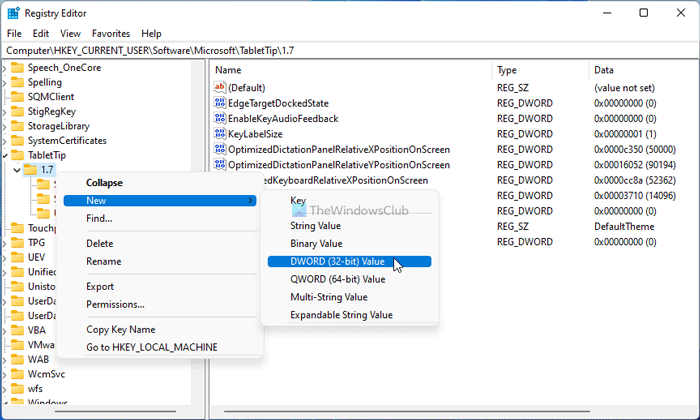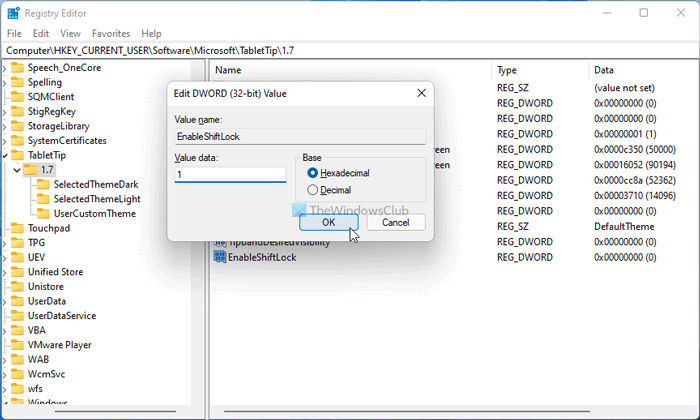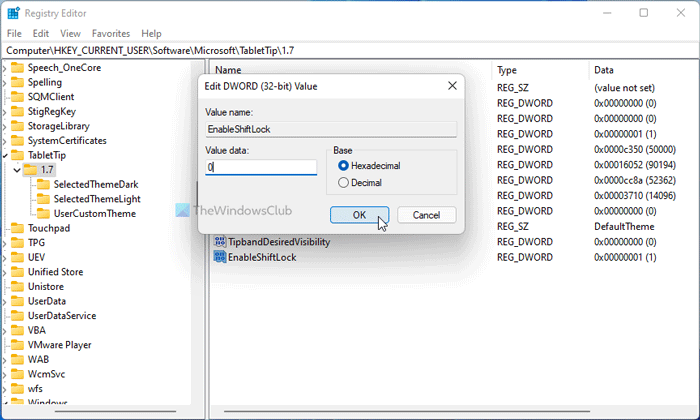If you want to enable or disable Shift Lock for Touch Keyboard in Windows 11 or Windows 10, this guide will help you do that. It is possible to turn on or off Shift Lock for your Touch keyboard with the help of the Registry Editor.
You might often need to type everything in any program in uppercase. If so, you have two options in hand. You can use either Caps Lock or press and hold the Shift key. Let’s assume that you do not want to use the Caps Lock due to fast track your typing speed or any other reasons. In that case, you need to press and hold the Shift key on the Touch keyboard to get the job done. On the other hand, let’s say that you do not want to use the Shift key as Caps Lock is already there. If you are in either situation, you can follow this tutorial to turn on or off Shift Lock for Touch keyboard.
For your information, you can enable Shift Lock by clicking on the Shift key twice. Similarly, if you click on the Shift key once again, it will be deactivated. However, if it is annoying for you, you can disable Shift Lock for the Touch keyboard. Before getting started, you must know that Shift Lock is not available in the Traditional keyboard layout.
As you are going to change values in the Registry Editor, it is recommended to create a System Restore point or backup Registry files.
Enable or Disable Shift Lock on Touch Keyboard in Windows 11/10
To turn on Shift Lock for Touch Keyboard in Windows 11/10, follow these steps:
- Press Win+R to open the Run prompt.
- Type regedit and press the Enter button.
- Click on the Yes button.
- Navigate to TabletTip\1.7 in HKCU.
- Right-click on 1.7.
- Select New > DWORD (32-bit) value.
- Name it as EnableShiftLock.
- Double-click on it to set the Value data as 1.
- Click the OK button.
- Restart the Windows Explorer process using Task Manager.
To know more about these steps, keep reading.
First, you need to open the Registry Editor on your computer. For that, press Win+R to open the Run prompt. Then, type regedit, and hit the Enter button. If the UAC prompt appears, click on the Yes button.
Next, navigate to this path:
HKEY_CURRENT_USER\Software\Microsoft\TabletTip\1.7
Here you need to find the EnableShiftLock DWORD value. If you cannot find it, you need to create the value manually. For that, right-click on 1.7, select New > DWORD (32-bit) Value, and name it as EnableShiftLock.

Then, double-click on it to set the Value data as 1.

Click the OK button to save the change. At last, open the Task Manager and restart the Windows Explorer process.
How to turn off Shift Lock for Touch Keyboard in Windows 11/10
To turn off Shift Lock for Touch Keyboard in Windows 11/10, follow these steps:
- Press Win+R > type regedit > press the Enter button.
- Click on the Yes option.
- Navigate to TabletTip\1.7 in HKCU.
- Double-click on the EnableShiftLock DWORD value.
- Set the Value data as 0.
- Click the OK button.
- Restart the Windows Explorer process.
Let’s delve into these steps in detail.
To get started, press Win+R > type regedit > press the Enter button and click on the Yes option to open the Registry Editor. Then, navigate to this path:
HKEY_CURRENT_USER\Software\Microsoft\TabletTip\1.7
Double-click EnableShiftLock DWORD value and set the Value data as 0.

Click the OK button to save the change and open the Task Manager to restart the Windows Explorer process.
Read: Stop Touch keyboard from showing Period after double-tapping Spacebar.
How do I turn on the SHIFT key lock?
You can double-click or tap the Shift button to activate the Shift Lock on the touch keyboard. To deactivate the Shift Lock, click or tap the Shift button again. When Shift Lock is activated, the Shift button will be highlighted and display a lock emblem. Shift lock is helpful in case where you have issues holding the down the Shift key for an extended period.
Why use Shift Lock when you have Caps Lock?
Some people may find Shift Lock more convenient to use than Caps Lock because it is activated and deactivated with a single key press rather than requiring an extra step to turn It on and off. However, Caps Lock is more widely supported and can be used on physical and virtual keyboards.
That’s all! Hope this guide helped.
Leave a Reply